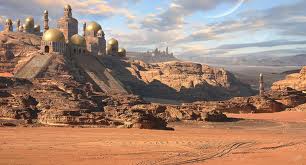From the Category, “The Eastern Eye”
[The Bible is an “Eastern” book. It was written many years ago in the “East” which today we refer to as “The Middle East.” As such, there are many customs and idioms that are not familiar to the “Western” mind.
In understanding the Scriptures it is important for us to understand the culture, but it doesn’t mean that we should necessarily follow that culture. Rather, it is in the understanding of the Eastern culture that we gain light and understanding about many things in the Bible.]
There are a couple of verses in Psalm 121 that might seem confusing or even misleading. But once again, a little understanding of the culture of the Bible helps us to understand.
When the Psalmist states, “I will lift up mine eyes unto the hills, from whence cometh my help,” both the punctuation and lack of cultural understanding can be misleading. He is not at all saying that his help comes from the “hills.”
What Did They See?
In Bible times, and indeed in some places even today, temples are found on high hills or mountain tops. From down below, it is very easy to see these buildings. Back then, and even today, those who gazed upon them would do so with reverence and respect, associating them with their god.
 There are other references in the Scriptures where they are called “high places.” If you are a fan of the Bible then you know these “high places” were not erected to or for the One True God, but rather to false gods.
There are other references in the Scriptures where they are called “high places.” If you are a fan of the Bible then you know these “high places” were not erected to or for the One True God, but rather to false gods.
I Need Help!
When people had situations going on where they needed help, they would either go and worship at those temples, or look up toward the hills or mountains where they could see the temple.
Those who either did not know the One True God or rejected Him would look to these pagan temples and to the gods they represented for their help in time of need. Sadly, even God’s chosen people in the Old Testament on many occasions shifted their trust from the One True God and instead sought help from false gods. God called it evil, and it is no surprise that it never worked for them
More Accurate Translation
Verse 1 of Psalm 121 would be more accurately translated as, “Shall I lift up mine eyes unto the hills? From whence cometh my help?” In other words, in times of trouble am I going to look to pagan gods and pagan temples for my help? Absolutely not!
The next verse answers both questions from verse 1 plainly: “My help comes from the Lord who made heaven and earth.” It is important to note that the “Lord” mentioned in verse 2 is not just any god, but rather it is the Creator of heaven and earth. My help comes from the One True God, the Creator of heaven and earth.
Our Help
In times of trouble, where should we seek help? Who can we put our absolute confidence and trust in? Who has promised to help and supply? We can and we should seek help from the One True God, the Father of the Lord Jesus Christ.
II Kings 17:9, 11, 27
And the children of Israel did secretly those things that were not right against the LORD their God, and they built them high places in all their cities, from the tower of the watchmen to the fenced city.And there they burnt incense in all the high places, as did the heathen whom the LORD carried away before them; and wrought wicked things to provoke the LORD to anger:
Howbeit every nation made gods of their own, and put them in the houses of the high places which the Samaritans had made, every nation in their cities wherein they dwelt.
Psalm 121: 1 and 2
I will lift up mine eyes unto the hills, from whence cometh my help.
[Shall I lift up mine eyes unto the hills? From whence cometh my help?]My help cometh from the LORD, which made heaven and earth.
Psalm 46:1
God is our refuge and strength, a very present help in trouble.
Mike Verdicchio
2011
Leave A Comment!
Do you have some thoughts about this? We’d love to hear what you think. To leave a comment if you are receiving this post via email or RSS, just click the title above and scroll to the bottom of the post and type in your comment. If not, just scroll to the bottom of this post and type in your comment.
Share This Article!
To share this article on social media, like Facebook, or, Twitter, there are links below.
Resources
There are a number of books that you can read to get insight on customs, manners, idioms and meanings from the Eastern culture in which the Bible was written. The best I know of were written by Bishop K. C. Pillai. I have had the pleasure of listening to many recorded teaching by him.
He wrote three books, and they are hard to find, and are usually over priced. But, if you want to you can check this link to see what Amazon has to offer. Light Through an Eastern Window
Another great resource that I have used for years is a book called, “Manners and Customs of the Bible,” by James Freeman. Mine was printed in 1972 and I know they have newer additions. For the newest edition, just click the link and it will take you to Amazon. The New Manners and Customs of the Bible (Pure Gold Classics)

Please note: I reserve the right to delete comments that are offensive or off-topic.